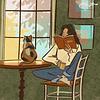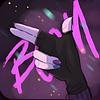Take a photo of a barcode or cover
adventurous
challenging
dark
mysterious
reflective
tense
slow-paced
Plot or Character Driven:
Character
Strong character development:
Yes
Loveable characters:
No
Diverse cast of characters:
Complicated
Flaws of characters a main focus:
Yes
I reread this after a sequence of books on the Democratic Republic of the Congo - Cobalt Red, The Poisonwood Bible, and King Leopold’s Ghost. Reading this for what it is - a beautifully written but devastating account of the horrors visited upon the Congo rather than an object lesson in literary techniques as it’s usually taught in high school, is a sobering experience. One finds in Kurtz and the malevolent emptiness at his heart a disturbing parallel to certain prominent figures of our times. This is a dark and awful tale, brilliantly told.
Yes it was the basis for Apocalypse Now, but if you've seen the movie you should still read the book. Take away the overtones of the Vietnam war and you have an extremely insightful look at the level of inhumanity it is possible for people to sink to when the constraints of civilization (and sanity) are removed. - Aimee F.
adventurous
dark
emotional
tense
slow-paced
Plot or Character Driven:
A mix
Strong character development:
No
Loveable characters:
No
Diverse cast of characters:
No
Flaws of characters a main focus:
Complicated
I had to read this book for my gothic literature class and I didn't enjoy a single second of it. I understand why it's considered gothic, however, it was just a story of a colonizer/seaman going to Africa in search of a man that was highly looked up to and did cruel awful things just to attain Ivory. I will not ever touch this book again. I appreciate that Kenneth Branagh and the production team changed the n word to native for the audiobook. Kenneth got me through this book, but barely. He's a great storytellor, I just have zero interest in this story.
adventurous
challenging
dark
emotional
funny
mysterious
reflective
sad
tense
medium-paced
Plot or Character Driven:
Plot
Strong character development:
No
Loveable characters:
Yes
Diverse cast of characters:
Yes
Flaws of characters a main focus:
Yes
oh, look how colonising africa made us lose our humanity
edit, may 2023: this book has been irking me a lot, probably because i have to refer to it again and again till the semester ends, but also because it does not quite fit into the box of other books i absolutely hated reading for class.
the reason opinions on this book are so divided is because conrad does not draw any conclusion of his narrative. he just states, with expressive prose nonetheless, the inner feelings of his character as he "stumbles" upon the true reality of colonialism. it makes me wonder, how could one react when they first come across the violence of an enterprise deemed "right" by everyone else, and would that reaction be any different from marlow? especially without the light of up-to-date discourse.
he's too passive yes, even revolting in his expression of coming across the "natives". he projects onto them, and draws a clear distance between himself and them, and does not reach out to learn more. he sees it all but does not has the guts to actually follow through his observations. is that his coping mechanism? an ordinary man coming across violence he never even dreamed of, so he focuses on the streamer, on something he can actually do, and on the "mysterious" kurtz.
sure, the book doesn't name any africans, but it doesn't name any europeans either. it's too shrouded in "fog". but the scene that most revolts me, marlow's helmsman dying right beside him and him not even blinking. but, what's more moral? the pilgrims displaying public sympathy or marlow's inner turmoil?
i'm not trying to validate him. i still hate him for his choices and most of conrad studies trying to remove the book from its background. perhaps this book was a cry at sympathy. but for something that made me contemplate a lot, i would like to bump it to three stars.
edit, may 2023: this book has been irking me a lot, probably because i have to refer to it again and again till the semester ends, but also because it does not quite fit into the box of other books i absolutely hated reading for class.
the reason opinions on this book are so divided is because conrad does not draw any conclusion of his narrative. he just states, with expressive prose nonetheless, the inner feelings of his character as he "stumbles" upon the true reality of colonialism. it makes me wonder, how could one react when they first come across the violence of an enterprise deemed "right" by everyone else, and would that reaction be any different from marlow? especially without the light of up-to-date discourse.
he's too passive yes, even revolting in his expression of coming across the "natives". he projects onto them, and draws a clear distance between himself and them, and does not reach out to learn more. he sees it all but does not has the guts to actually follow through his observations. is that his coping mechanism? an ordinary man coming across violence he never even dreamed of, so he focuses on the streamer, on something he can actually do, and on the "mysterious" kurtz.
sure, the book doesn't name any africans, but it doesn't name any europeans either. it's too shrouded in "fog". but the scene that most revolts me, marlow's helmsman dying right beside him and him not even blinking. but, what's more moral? the pilgrims displaying public sympathy or marlow's inner turmoil?
i'm not trying to validate him. i still hate him for his choices and most of conrad studies trying to remove the book from its background. perhaps this book was a cry at sympathy. but for something that made me contemplate a lot, i would like to bump it to three stars.
I saw 'Apocalypse Now' on TV over the weekend and had a new appreciation for the AP Lit & Composition teacher who insisted we read this during the first week of our junior year. Reading this book was like slogging through a jungle swamp, for me, until Marlow(e?) returns home and sees it as though through alien eyes. The light of redemption outshines the light of civilization.
Get this book away from me. I read it in high school and absolutely positively could not stand it, and unlike a lot of books I didn't like during that time, I know it's not because I was being a silly, stubborn girl. I really, really read this one, and I couldn't stand it. Gross.
dark
mysterious
slow-paced
Plot or Character Driven:
A mix
Strong character development:
Complicated
Loveable characters:
Complicated
Diverse cast of characters:
Complicated
Flaws of characters a main focus:
No
adventurous
challenging
dark
reflective
sad
medium-paced
Plot or Character Driven:
Plot
Strong character development:
N/A
Loveable characters:
No
Diverse cast of characters:
No
Flaws of characters a main focus:
No
I think as I got older I learnt to read more patiently and thoughtfully, so this second reading of Heart of Darkness is better nuanced and layered with life experience, historical context, and a richer, more powerful imagination. I can see better the deep, forbidding Jungle which Conrad composes, the deep silence he weaves out of just words, and it is a quite a solemn pleasure to steep and travel into this prose now.
The walls of text, the turgid paragraphs may just be Conrad's style, and/or a convention of the period, but they also mirror the impenetrable jungle he writes about. I can't help but wonder if this was a deliberate choice in form, along with the almost hypnotic rhythm of the narrative.
I still don't really like the thick chunks of introspective text, and the layers of unspoken meanings hiding that sit beneath the dialogue. As a modern, Singaporean reader unfamiliar with the speaking and writing conventions of this period, I can't help but feel I'm missing several strata of inside-meanings, symbolisms and half-thought references here in moments when the protagonist speaks with other characters.
The walls of text, the turgid paragraphs may just be Conrad's style, and/or a convention of the period, but they also mirror the impenetrable jungle he writes about. I can't help but wonder if this was a deliberate choice in form, along with the almost hypnotic rhythm of the narrative.
I still don't really like the thick chunks of introspective text, and the layers of unspoken meanings hiding that sit beneath the dialogue. As a modern, Singaporean reader unfamiliar with the speaking and writing conventions of this period, I can't help but feel I'm missing several strata of inside-meanings, symbolisms and half-thought references here in moments when the protagonist speaks with other characters.





